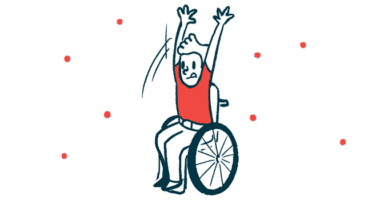Motherhood Isn’t Right for Every Woman With SMA, and That’s OK


As a young teenager, I went with my mom to a workshop at a Cure SMA conference about living with SMA as a woman. A room full of young ladies and their mothers spent the afternoon asking questions of the panelists and seeking to gain wisdom and guidance from their lived experiences.
Because it was a session specifically for women, conversation topics included menstruation, pregnancy, childbirth, motherhood, and women’s healthcare in general. These are necessary for women with SMA and their caregivers to learn about, especially considering our unique care needs and body shapes, but they tend to get overlooked in favor of other essential healthcare specialties like respiratory care.
After the workshop concluded, my mom asked me what I thought. I resolutely informed her, “I am never having children.” While I may not have understood the full weight of that proclamation then, I’d gleaned enough from the panelists’ expertise to realize that being (and becoming) a woman could be hard on my fragile body.
At nearly 25, my reasoning and understanding are now more concrete, and I’m confident that I’ve made the right choice in not having children naturally.
Before I go any further, let me just say that I have great admiration for mothers. Growing a human being is an incredible feat. I have nothing but praise for the women, with and without SMA, who undergo this for their children. This column is in no way intended to discourage or invalidate that choice. It’s meant to encourage greater understanding and respect for all women and their individual choices and feelings regarding motherhood.
Traditional motherhood is a wonderful experience for many. Some may choose not to have children for medical, financial, or other personal reasons. Others simply might not want them or have different callings. Still others may want children, but opt for alternate routes like adoption or surrogacy. And all of those choices are OK.
Yet society doesn’t always seem to view or treat these choices with equal respect. Young women are often pressured to marry and have children before their biological clocks run out. It’s just what we’re supposed to do. It’s what we’re supposed to want. And if we don’t? Well, we’ll change our minds once we actually have kids.
I always thought I’d be exempt from that societal pressure. Having a baby is extremely risky for someone with SMA. Pregnancy could cause my health and strength to decline permanently. It could jeopardize my life as well as the child’s.
In this article on the Metro site, author Shona Cobb notes that as her disability becomes more visible, people assume that she’s childless because she’s disabled. She shares her frustration with false assumptions that she doesn’t have children because her disability renders her unable to care for them well or because she fears genetically passing her condition to them. In actuality, her decision has nothing to do with her disability.
We should never try to presume a person’s desires or capabilities based on disability, but I’d hoped that this was one situation where stigma might play to my advantage. Surely, I’d never have to explain why I don’t have and might not want kids because, regardless of the real reasons, no one would expect someone with a severe physical disability to have a baby. Right?
Fortunately, my family is always very supportive of my life choices, and I’ve never had to answer badgering questions about when I’ll have children. But I was wrong to think I could completely escape that pressure because of my disability. Sadly, it still exists, even in the disability community.
When a disabled woman gives birth, she’s often showered with praise and support, and she should be. Every mother should. But when we primarily — or exclusively — champion women with children, what message are we sending to childless women in the same community?
By inadvertently ignoring or brushing them aside, we risk telling them they’re less valuable as women because they’re childless. What does that message do to women’s mental health and self-esteem?
We should be including and celebrating all women, with and without children. This article by Jean E. Jones on the Today’s Christian Woman site gives practical ideas on welcoming childless women in the church, and many of them can apply to any community.
I hope that society soon learns not to define a woman’s worth or success by whether she has children. It’s a deeply personal choice that should be respected. Everyone deserves to be able to make that choice without fear of judgment, isolation, or shame.
Whether a woman has any number of kids, has decided not to have any, never got to choose, or hasn’t chosen yet, we’re all equally amazing and valuable. We’re all doing what’s right for us, and that’s OK. In fact, it’s great.
Note: SMA News Today is strictly a news and information website about the disease. It does not provide medical advice, diagnosis, or treatment. This content is not intended to be a substitute for professional medical advice, diagnosis, or treatment. Always seek the advice of your physician or other qualified health provider with any questions you may have regarding a medical condition. Never disregard professional medical advice or delay in seeking it because of something you have read on this website. The opinions expressed in this column are not those of SMA News Today or its parent company, BioNews, and are intended to spark discussion about issues pertaining to spinal muscular atrophy.
The post Motherhood Isn’t Right for Every Woman With SMA, and That’s OK appeared first on SMA News Today.




